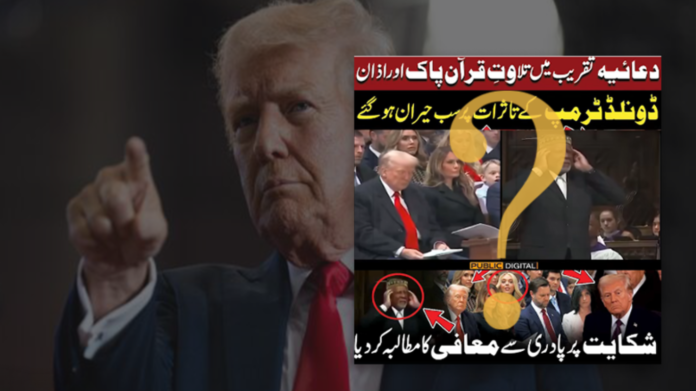A video circulating on social media is misleading viewers into believing that U.S. President Donald Trump reacted emotionally—or even negatively—upon hearing the Azaan (Muslim call to prayer) during the national prayer service held on 21 January 2025. However, a closer fact-check reveals that the viral claim is entirely inaccurate.
The misleading post, originally shared by Pakistan-based Public News, featured a clickbait caption in Urdu that claimed:
“Everyone was surprised by Donald Trump’s expressions during the Quran recitation and call to prayer… He even demanded an apology from the priest.”
What Really Happened
The prayer service took place at Washington National Cathedral, a tradition that follows every U.S. presidential inauguration. Leaders from various faiths—including Christian, Muslim, and Jewish communities—led the ceremony with prayers, hymns, and religious recitations.
While the Azaan was indeed heard around the 33-minute mark in the Times of India’s livestream of the event, there is no footage or evidence of Donald Trump reacting, protesting, or demanding an apology related to the Islamic prayer call.
What Was Trump’s Actual Complaint?
Donald Trump did express outrage after the service, but not because of the Muslim call to prayer. His complaint was directed at Episcopal Bishop Mariann Budde, who used the occasion to urge Trump to show mercy to migrants and LGBTQ+ communities, following his signing of controversial executive orders on gender identity and immigration.
In response, Trump posted on his platform Truth Social, calling the bishop’s remarks “nasty” and demanding an apology—but nowhere did he mention the Azaan or express disapproval of its inclusion in the interfaith service.
Why It Matters
For Indian readers, this highlights the importance of verifying international news—especially when it touches on sensitive religious or political themes. Misleading captions, especially those that evoke emotion or religious identity, can quickly go viral and distort reality.
The video in question gained over 45,000 likes and 2,400 comments, demonstrating how rapidly misinformation can spread when framed with sensational headlines.
In an age of fast content and viral narratives, critical thinking and fact-checking are essential. The Trump-Azaan video is a textbook example of clickbait misleading viewers—especially those who don’t cross-check with credible sources.
Always look beyond the caption. In this case, Trump’s real issue was political, not religious.








